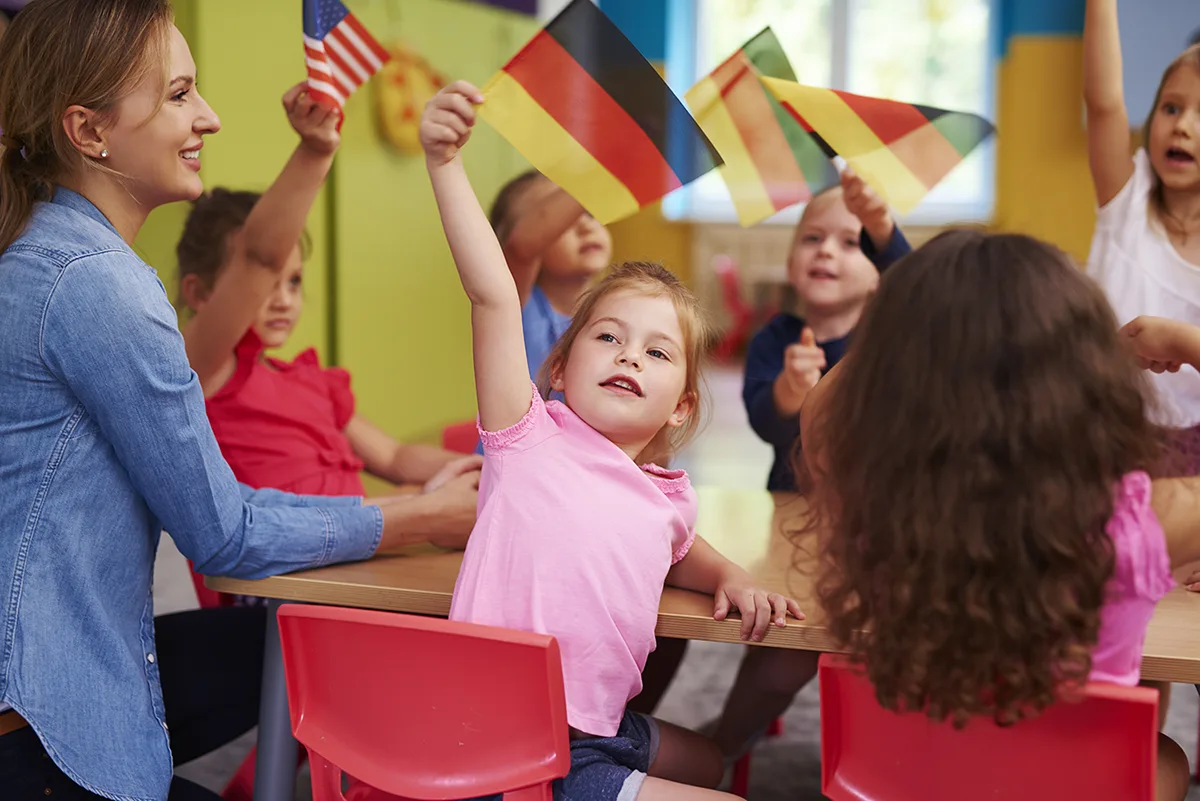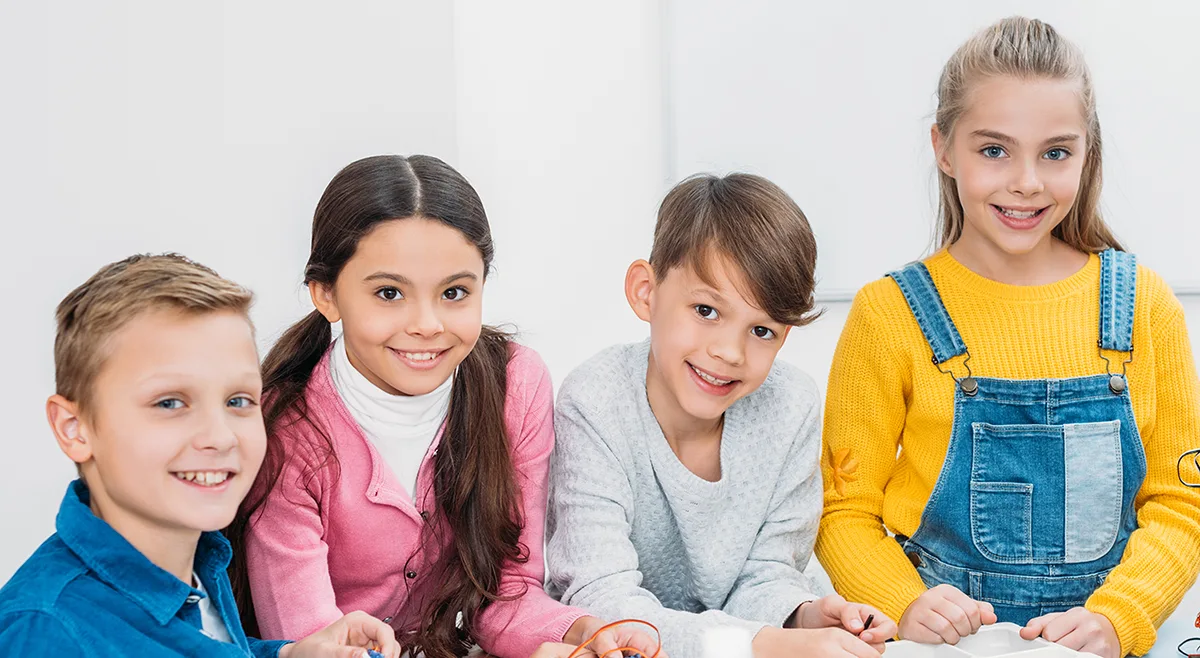The German language in Switzerland
German as an official language
The German language plays a central role in Switzerland as one of the country's four official languages. Around 62% of the Swiss population speaks German, making it the most widely spoken language in the country. This official recognition means that German dominates in many areas of public and private life, including education, administration and business. For Kids and Teens people living in Switzerland, learning German is therefore essential to navigate everyday life and the school system with ease.
Regional distribution
German is not only an official language, but is also spoken in numerous cantons and cities. German-speaking cantons such as Zurich, Bern, Basel-Stadt, Basel-Landschaft, Lucerne, Aargau, Thurgau and others are culturally and economically important. In most of these regions, German is the predominant language in schools, at work and in the social environment. Mastering the German language is therefore of great importance for Kids and Teens who live or go to school in one of these cantons in order to communicate and integrate successfully.
Advantages of learning German for children in Switzerland
 School integration
School integration
German language skills are a key to successful integration into the Swiss school system. In the German-speaking cantons, most lessons are held in German. Children who speak the language can follow lessons more easily, do their homework more efficiently and actively participate in class discussions. This not only boosts their academic performance, but also their self-confidence and motivation.
Social integration
Language plays a crucial role in building friendships and social networks. Children who speak German can communicate more easily with their classmates, participate in group activities and become part of the community. These social connections are important for children's emotional and psychological development and help them to feel comfortable and accepted in their environment.
Access to higher education
German language skills are also very important for access to secondary schools and universities. Many secondary educational institutions in Switzerland, especially in the German-speaking cantons, require a good knowledge of German. Students who are proficient in the language have a better chance of being accepted into demanding grammar schools, vocational schools and universities. This in turn opens up a wide range of professional prospects and career opportunities for them in the future.
Career prospects
Career opportunities
Learning German for Kids and Teens offers considerable advantages in the Swiss working world. As German is one of the official languages and is used in many companies and organizations, people who speak the language fluently have better job opportunities. Employers value employees who can communicate easily in German, as this increases efficiency in everyday working life and reduces misunderstandings. In addition, many of the largest and most successful companies in Switzerland are based in German-speaking regions, which further increases the demand for German language skills.
Internships and apprenticeships
Good German language skills open up numerous opportunities for children and young people to find internships and apprenticeships. Many companies prefer applicants who can communicate confidently in German, as they can be better integrated into the team and work more effectively. Internships and apprenticeships are often the first step in a successful career, and German language skills can make all the difference in getting these coveted positions. By learning German, Kids and Teens can establish important professional networks early on and gain practical experience that will benefit them in the long term.
Cultural enrichment
Cultural understanding
Learning German is essential for a deeper understanding and appreciation of Swiss culture. Language and culture are closely linked; by mastering the language, children can not only better understand the history and traditions of Switzerland, but also participate in cultural exchange programs. Knowledge of German enables children to enjoy literature, music, films and theater performances in their original language and thus gain an authentic insight into the Swiss way of life.
Participation in cultural activities
Participation in cultural activities offers children who are learning German numerous opportunities. In many German-speaking cantons, there are regular events such as town festivals, theater performances, readings and music festivals where German is the main language. Kids and Teens Those who speak the language can fully enjoy these events and even actively participate in them, be it in school performances, local clubs or youth groups. This not only promotes their understanding of the language, but also their social integration and cultural awareness.
Tips to make it easier for children to learn German
Everyday language
One of the most effective ways to make learning German easier for Kids and Teens is to integrate the language into everyday life. Parents can have simple and everyday conversations in German, e.g. when eating, shopping or playing together. Regularly using the language in natural situations helps children and young people to develop a feel for German and learn it intuitively. It is also helpful to carry out certain routine tasks in German, such as counting objects or naming colors and shapes.
Games and books
Games and books are excellent tools for teaching German to children through play. There are many child-friendly learning materials that are specifically designed to promote German language skills. Recommended books such as "Der Grüffelo" by Julia Donaldson or "Die kleine Raupe Nimmersatt" by Eric Carle offer exciting stories in German. Board games such as "Sagaland" or "Lotti Karotti" also promote an understanding of the German language through play. Such activities make learning entertaining and varied, which increases the motivation of children and young people.
Media use
The use of German-language films, series and music can significantly support learning German for Kids and Teens. By regularly consuming media in German, they can improve their listening and speaking skills. Films and series offer an authentic language environment and help children and young people to learn pronunciation and the natural flow of language. Music and radio plays promote an understanding of the rhythm and intonation of the German language. Media not only teach vocabulary and grammar, but also cultural content that deepens the understanding of the German language and makes the learning process more varied.
Support through professional German courses
Structured lessons
German courses for Kids and Teens offer structured lessons that are systematically tailored to the language development of the participants. In contrast to self-study, organized German courses offer clear learning objectives, curricula and progress assessments. This enables children and young people to learn within a structured framework and to better track their progress. Lessons are taught by qualified teachers who have pedagogical expertise and experience in teaching children.
Individual support
German courses for children offer individual support that is tailored to the specific needs and level of the participants. Teachers can specifically address weaknesses and adapt the lessons to the learning speed of each child. This not only promotes understanding and confidence in the German language, but also strengthens the children's self-confidence in using German.
Why ILS-Junior is the best choice
Experienced teachers
At ILS-Junior the German courses for Kids and Teens are led by experienced teachers who have in-depth knowledge of teaching German courses for Kids and Teens . Our teachers specialize in creating a supportive learning environment and taking into account the individual needs of each student.
Adapted teaching methods
ILS-Junior uses specially developed teaching methods that are tailored to the learning styles and needs of children in German courses. Our curricula combine playful elements with structured lessons to arouse the interest of children and teenagers and encourage their motivation to learn German in the course.
Successes of our students
Many of our students have completed their German course by participating in ILS-Junior. German course for Kids and Teens significantly improved. Success stories show how children have benefited from our courses not only linguistically, but also academically and socially.
Registration and further information
Parents can easily register their children for a German course for children at ILS-Junior Register. Visit our website to find out more about our German courses for Kids and Teens to view teacher profiles and find out about the enrollment process. We will be happy to help you with any questions you may have and ensure that your child receives the best possible support in learning German on the course.







